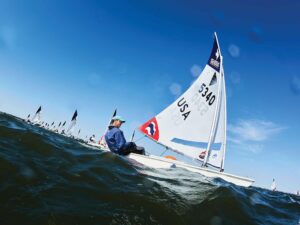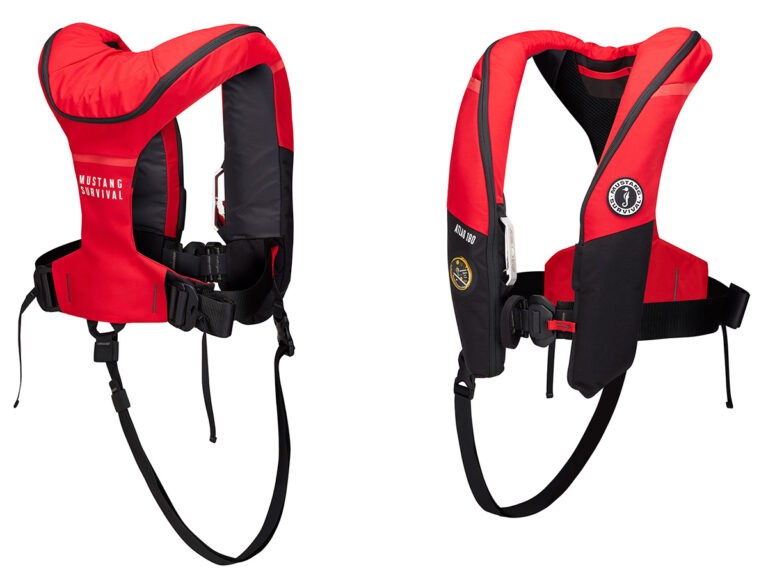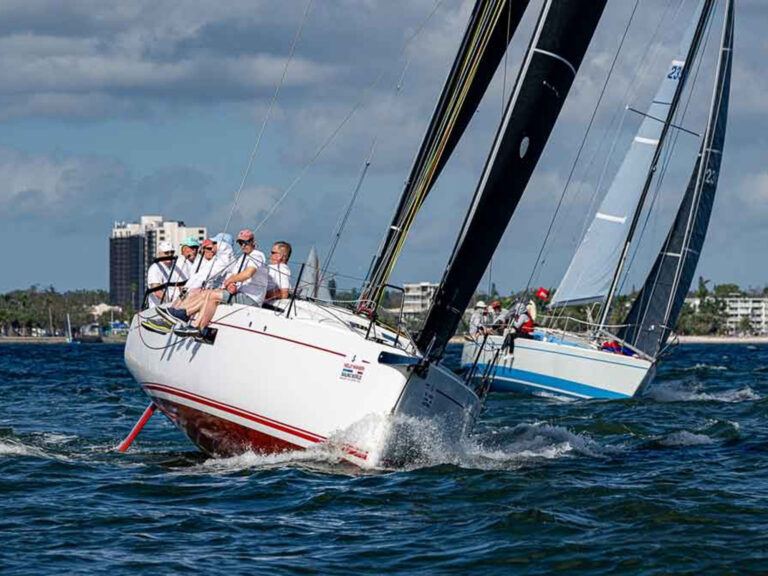
It’s the last leg of the race, and we’re beating to the finish of a race at the Kings Point Dinghy Open. We’re in first, I’m hiking as hard as I can, each wave hitting us with a slap of frigid water. My skipper has a bum knee, but he’s fighting through the pain, legs fully extended from the hiking straps that strain under our collective load.
We both desperately want this race win, which will also win us our division. Still, we’re laughing through every wave and gust of wind. Dumping the mainsheet does little to ease the strain on our burning leg muscles. Meanwhile, our light-air teammates are warm and dry on land, cheering us on and helping us get through the day. It’s a glorious moment for college sailing’s “heavies,” and in this moment, I wouldn’t trade my place with anyone on shore.
Heavy-air crews like me don’t get the glamour of regular-size college sailors. We might be big, but we’re rarely the big names on the team roster. Heavies do, however, play a critical role in the collective team effort. Every good sailing team is sure to travel with a heavy every weekend. Without one at the ready, the team is vulnerable when the breeze turns on.
In the boat, a heavy-air crew has the same jobs of any other crew: sailing the boat smooth through the water, observing the racecourse, and relaying essential information to the skipper. A dinghy sails differently with the extra weight up front, so it’s important to practice with the skipper to find the right balance. First penalty turns will be atrocious, but with practice and communication, they will improve.
The success of the team depends on all of its assets, and a heavy crew is an asset any great coach will appreciate. My college sailing career as a heavy, at the College of Charleston, was with a top-ranked team that won the Fowle Trophy my senior year. We performed well in every discipline that college sailing has to offer, on and off the water. During my college sailing career, I was part of two national championships, and I was surrounded weekend after weekend with people who love sailing as much as I do. The College of Charleston and other successful sailing programs succeed when everyone is committed to the program. Everyone does his or her job to ensure the program succeeds. Everyone supports each other and puts the team first to realize its full potential.
I understood this well when I joined the team, and somewhere along the way, I was asked if I would be a heavy-air crew. I said yes — despite having zero crewing background. Thanks to supportive coaches and patient teammates, however, I thrived in my role. I never considered myself All-American material, nor do I think my fearsome jib-trimming skills won any regatta. No, the best part of becoming a heavy-air crew is what I learned from the entire college sailing experience.
Every weekend I’d load up into the team van with best friends and drive to a regatta, listening to the latest twerking song my teammate Jake Reynolds had found on YouTube. At the regattas, I sailed with and against the best sailors in competition. I learned and gained perspective from other racers, which helped my own sailing. Having such skilled skippers in the boat allowed me to ask about changes we were making and why.
Most people think heavy crews don’t get to sail often because it’s not windy enough and therefore are not as skilled as light crews. Not so. While everyone wants to drive or crew every race, only two people get to steer at most college regattas. Going to a big sailing school that attracts the best sailors in the country doesn’t mean you’ll always get to drive, or even race. Most passionate college sailors, however, are not concerned with owning a starting spot, especially if given the opportunity to progress and develop skills. Even if heavier crews get put in less often because of light winds, they can still learn more by traveling with the team.
I learned how to contribute as a teammate after I was given the opportunity to crew. If you’re considering sailing in college, put yourself in a position where you can learn the most. As our coach would say, “You have to learn how to learn.” I hope he’s reading this, and laughing at the irony of me citing him.
Being prepared to sail at a moment’s notice is what heavy-air crewing is all about. Living in a drysuit, always ready to go, watching the racing, and listening to the coaches’ peanut gallery is all part of the job. It’s important to be prepared for the next step, whether that entails being ready to sail, helping out teammates between rotations, jumping in the van without showering, or packing your bag to get on a plane in an hour because the forecast changed. I was definitely not very good at this and spent most of my time just sending it, doing it live, and somehow making it work out.
“Sailing is a mental sport, and even more so for heavy-air crews.”
I often joke that every heavy should be issued an honorary degree in psychology. We are the support system for skippers in the roughest conditions and cheerleaders for the entire team when it gets light. Emotions and tempers can be a roller-coaster ride in sailing: Keeping everyone focused and successful on the water is difficult; teammates can shut down and quit or get so excited or overconfident that they lose focus, which leads to disaster.
As a heavy, you get to deal with all of these situations and the effect they have on multiple personalities, all while being in competition mode trying to win races. There’s also a coach who needs confirmation of his decisions and support in the operation so he can focus on what’s happening on the water and throughout the day.
After each regatta, you return to campus, to your team, and have to be a positive support unit for them throughout the following week of practice. A heavy is required to learn how to deal with all the different temperaments and personalities on the team and how to keep everyone focused on the goal, even when situations get stressful. Because of this, a heavy is often the person most in touch with the needs of the team and the areas that could use improvement. I was able to apply my skills as a heavy to help my team in this way, off the water, when I was elected captain. I was called upon in some of the most precarious sailing situations to keep the momentum going in a regatta when the wind picked up, and because of this, I learned to be dependable and reliable for my teammates — a characteristic that I tried my best to carry through to my role as captain as well. Which brings me to my final example of the heavy’s role.
Two days before leaving for Nationals, we were in a three-boat pace upwind. (When it isn’t breezy enough to crew, I will skipper another dinghy in drills and practice.) On this particular day, I’m fast. It’s two of our best skippers, Jake Reynolds and Ryan Davidson (who is my skipper in breeze), and me, lined up and charging upwind. Jake is unable to hang with us and continues to struggle in the challenging chop.
At the advice of our sailing director Greg Fisher, we pull back, switch boats, and do everything possible to make Jake faster. Here I am, sailing better than this guy who is far better than me, and I have to be concerned with his well-being. Remember, the second part to any successful sailing program is that everyone must do their job. At this moment, I have to play the psychologist. Jake is about to compete in one of the most important sailing events of his life, and he is struggling to make his boat go through the water. While I’m able to outsail him on this day, it’s not our goal. The practice is designed to prepare to race, not for me to kick his butt. My job is to do whatever it takes to prepare the team to win. This is usually the most exhausting part of being a heavy, and it takes an energetic, charismatic, sometimes-goofy person to pull it off. In the end, it is also the most rewarding job on the team.









